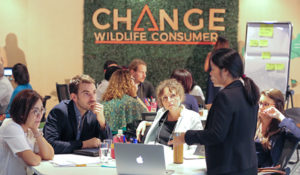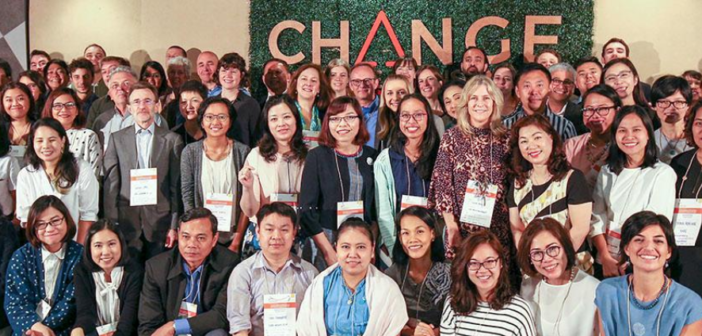Deepening insight and supporting impactful practices around influencing wildlife product consumer behavior was the focus of a three-day event that brought together over 100 participants, representing 60 organisations across 21 countries, from the demand reduction sector.
The 2nd International Conference Revisiting Efforts to Reduce Demand for Illegal Wildlife Products: Showcasing Best Practice in Behavioural Change was held in Bangkok, Thailand, from November 28-30. The conference sought to build on the collaborations now occurring across the Community of Practice, and deepened insights into several key areas of behavioral science application within a wildlife conservation context.
A combination of “deep dive working groups,” presentations, “masterclass” sessions, interactive training sessions, and networking opportunities stimulated discussion around opportunities to showcase the best in behavioral science, and strengthen skills and further increase knowledge throughout the conference.
Said Gayle Burgess, TRAFFIC’s Behavioural Change Co-ordinator, “Our ambition was to build on the fantastic atmosphere of collaboration apparent across the Community of Practice, by really deepening insight and practice around a few key areas of behavioral science application.”

Innovative approaches to demand reduction and the exchange of behavioral insights were themes at the heart of discussions between participants.
“This event explored themes at the forefront of demand reduction initiative design, such as the role of ‘catalyst and gateway’ behaviours; how to strengthen impact measurement; and the role of concepts well established in fields such as pro-health and pro-environment behaviors, such as the ‘Value-Action’ or ‘Attitude-Action’ gap. Community members can draw from collective experience in order to refine demand reduction and social marketing initiative design, to support our work towards a common goal—in this case, reducing demand for illegal wildlife products.”
The conference was structured through three stages to showcase best practices from Social and Behavioral Change Communications (SBCC), and to stimulate the exchange of skills, experience, and knowledge from all members of the Community of Practice.
“Harnessing the power of existing behavioral science expertise is critical to the development of impactful SBCC interventions. It’s seldom you see such a rich diversity of people working within behavioral change all in one room—we look forward to seeing this event contribute to the meaningful conservation impact behavioral change initiatives are already bringing about,” said Steven Broad, TRAFFIC’s Executive Director.
“Behavioral change science holds the potential to be a game changer within wildlife conservation, if applied in a targeted and methodical way,” said Monica Zavagli, TRAFFIC’s Senior Program Officer. “This conference demonstrated how the behavioral change Community of Practice is more engaged, experienced, and ready to collaborate than ever before. The future of SBCC within a wildlife conservation context is looking brighter than it ever has.”
The Conference was generously supported by USAID, through the Wildlife Trafficking Response, Assessment and Priority Setting (Wildlife TRAPS) project, with a contribution from the German Partnership project, implemented by GIZ on behalf of the German Federal Ministry for Economic Cooperation and Development (BMZ) and the German Federal Ministry for Environment, Nature Conservation and Nuclear Safety (BMU); and the Asia Wildlife Enforcement and Demand Management project, funded by the European Union.
The full set of presentations, interviews, and supplementary materials are available on the events page of the Change Wildlife Consumers toolkit.
Featured image: participants at the conference. This image and all images in this story via TRAFFIC.





